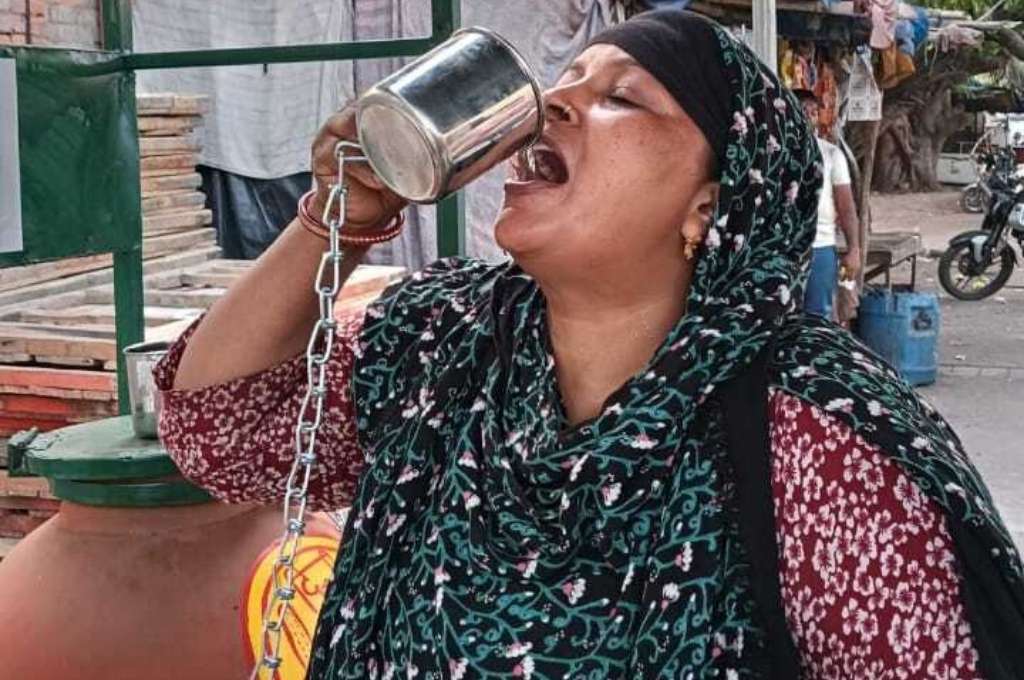
Every day, in the early hours of the morning, thousands gather at labour chowks (informal labour hubs) across Delhi in search of daily wage work. As the day progresses, the temperature increases. Workers wait for hours under the sun, many forced to spend up to INR 100 every day just to buy drinking water to cope with the sweltering heat. With average daily wages of INR 650, this amount is a significant burden for workers who are already navigating precarious employment and income.
Delhi has had a tradition of setting up public pyaos (free drinking water stations) during the summer, but this practice is becoming increasingly rare. These pyaos used to be set up in accessible open spaces, and would be maintained by shopkeepers, market associations, nonprofits, or volunteers. However, citing hygiene concerns and risk of contamination, local authorities have become resistant to granting permissions for these structures.
There are a few other factors that have led to the removal of these public drinking water stations. One such station used to be located at the labour chowk in Dilshad Colony, North East Delhi. A few years ago, a local shopkeeper approached the Municipal Corporation of Delhi (MCD) and complained that people drinking from the station would spill water on the ground—this would cause wet mud to accumulate outside his shop. The shopkeeper filed a formal application, and the pyao was removed by the MCD.
My organisation Basti Suraksha Manch, in collaboration with partner organisations, tried to convince the MCD that the pyao was a necessity. We explained our model to them, under which we would set up water ATMs in Delhi. These would include pots secured with an iron lid and placed within an iron frame that would be locked. The key would be with a local shopkeeper, and the pots would be unlocked only when the Delhi Jal Board would refill them. However, local ward officials rejected the idea.
Eventually, we were able to set up a water ATM in New Seemapuri, which is just across the street from Dilshad Colony. We met with the local MLA and explained our concept, and he helped us get permission from the MCD to build the drinking station. We have been able to set up temporary water ATMs at four locations in the Seemapuri area so far.
It costs INR 7,500 to set up a two-pot station and INR 11,000 for a three-pot station. Each 40-litre pot needs to be refilled four times a day. Three out of the four locations had existing water access, so the shopkeepers in the area voluntarily supported the initiative by providing water pipes and managing refills during the Delhi Jal Board’s daily scheduled supply.
However, we are still facing challenges in refilling our water ATM at the New Seemapuri Depot because there is no water connection in the vicinity. At present, we have been refilling it using 20-litre water cans. We are also running a two-month campaign to urge people to contribute funds that would be sufficient to refill a water ATM for just one day, which costs approximately INR 600.
The biggest barrier to expanding water ATMs remains finding a suitable space and getting official permission. We have been able to build this movement to demand water, which is a basic right, but the government must pay attention.
There are up to 300–400 labour chowks in Delhi. If each ward councillor or local lawmaker commits to establishing a pyao or water ATM in such areas, they can ensure that this necessity is no longer denied to the workers, who bear the brunt of rising temperatures as they build and develop this city every day.
Sheikh Akbar Ali is a housing rights activist and co-founder of Basti Suraksha Manch.
—
Know more: Learn how water scarcity impacts Rohingya women at a refugee camp in Delhi.



